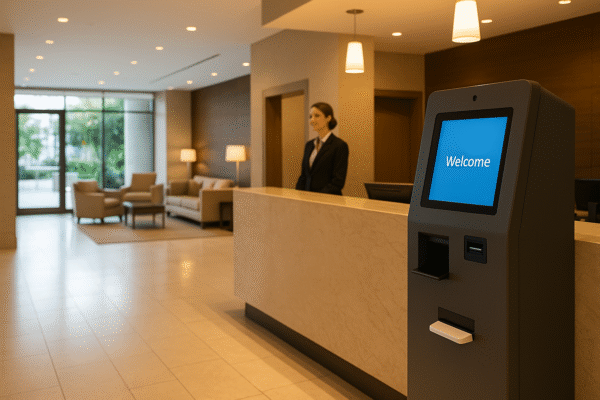The global tourism and hospitality industry is witnessing a rapid digital transformation, with technology playing a central role in shaping how hotels and resorts operate. At the heart of this change lies the Hotel Property Management System (PMS), a platform designed to manage reservations, guest services, billing, housekeeping, and real-time analytics. Recent market forecasts suggest that the global hotel PMS market is projected to reach USD 7.3 billion by 2031, recording an impressive compound annual growth rate (CAGR) of 16.8 percent during the forecast period of 2024 to 2031.
This growth reflects the increasing reliance of the hospitality sector on technology to deliver efficiency, enhance guest experiences, and remain competitive in an evolving tourism landscape.
Evolution of Hotel PMS: From Legacy Systems to Cloud-Based Platforms
Traditionally, hotels relied on manual processes or outdated legacy systems to manage bookings and operations. These systems, while functional, often created bottlenecks in efficiency and limited the ability of hoteliers to personalize guest experiences. In recent years, however, the industry has witnessed a massive shift toward cloud-based PMS platforms.
Cloud solutions provide hotels with unparalleled flexibility, scalability, and real-time data management. For guests, this translates into faster check-ins, easier access to services, and highly personalized interactions. For hoteliers, the technology allows for centralized operations across multiple properties, seamless integration with external services such as airlines and car rental companies, and better insights into customer preferences.
Global tourism hubs like Paris, Tokyo, Dubai, and New York exemplify this trend, as hotels in these destinations adopt advanced PMS platforms to meet rising traveler expectations for digital convenience.
Regional Drivers of Hotel PMS Growth
The adoption of PMS solutions varies across regions, but each market demonstrates unique factors driving growth.
North America leads in the adoption of cloud-based hotel PMS platforms. The region’s strong tourism infrastructure, combined with a high level of digital awareness, has accelerated the use of advanced hospitality technology. Hotels in the United States and Canada are particularly focused on integrating PMS systems with guest loyalty programs and mobile applications to build stronger customer relationships.
Europe is emphasizing personalization and sustainability. Countries such as the United Kingdom, Germany, and France are increasingly investing in eco-friendly hotel solutions and personalized services to attract tourists who prioritize sustainable travel. Here, PMS systems are crucial for tracking energy consumption, managing eco-certifications, and offering green options for environmentally conscious travelers.
Asia-Pacific is emerging as the fastest-growing region in the hotel PMS market. With booming tourism in China, India, and Southeast Asia, the demand for digital transformation is immense. Hotels in this region are adopting PMS platforms not only to streamline operations but also to accommodate the surge in middle-class tourism. Digitization is enabling hotels to scale operations quickly and handle the rising volume of guests more effectively.
Hotel PMS Solutions for Small and Large Operators
One of the strengths of the PMS market is its adaptability for hotels of all sizes. Large international hotel chains often prefer customized or on-premise PMS platforms, which give them greater control over data and compliance, especially in markets with strict regulatory frameworks. These systems are designed to support thousands of rooms across multiple countries, making them vital for global operators.
On the other hand, small and medium-sized hotels are increasingly adopting cloud-based PMS platforms. These solutions offer lower upfront costs, ease of deployment, and minimal technical expertise, enabling smaller players to compete with established hotel groups. By using PMS platforms, boutique hotels and independent operators can offer features such as mobile check-ins, automated billing, and real-time communication with guests—once considered exclusive to larger chains.
Tourist-heavy destinations like Orlando, Bangkok, and Bali benefit significantly from PMS adoption. In such regions, where high tourist volumes can overwhelm staff, PMS systems streamline day-to-day operations, allowing hotel teams to focus more on personalized service.
Future Outlook: AI, Mobile Integration, and Guest-Centric Services
The next phase of PMS evolution will be shaped by artificial intelligence, mobile applications, and greater integration across tourism services. AI-powered tools are already being tested to predict guest preferences, recommend personalized itineraries, and optimize pricing strategies based on demand patterns. Mobile integration will further empower guests, giving them the ability to check in, access digital keys, book amenities, and even communicate with virtual concierges directly through smartphones.
Additionally, PMS platforms will play a vital role in enhancing sustainability practices by enabling hotels to monitor energy consumption, track carbon footprints, and provide eco-friendly options to travelers. This aligns with the global push for responsible and sustainable tourism.
Why the Hotel PMS Market Matters for Tourism
The continued expansion of the hotel PMS market has broad implications for the tourism industry as a whole. For travelers, advanced PMS solutions mean smoother experiences—from quick check-ins to personalized services and faster responses to requests. For hotels, these systems provide critical efficiency, reduce costs, and open the door to new revenue streams.
As the global tourism industry expands and diversifies, PMS platforms will be essential tools for ensuring that hospitality providers can deliver seamless, tech-driven services to millions of travelers. With the market projected to reach USD 7.3 billion by 2031, the importance of PMS technology will only grow, reinforcing its role as the backbone of modern hotel operations.
For more travel news like this, keep reading Global Travel Wire















